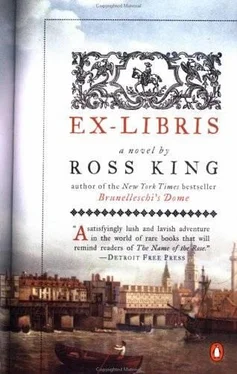At last I had leaned back in the chair, exhausted, and watched the latest candle expend itself, hissing and spitting like a kitten. A warm wind was gusting through the window, rattling the shutters and guttering the flame. All at once I felt more tired than ever. I closed my eyes and for an instant, half asleep, glimpsed rising before me the outline of Pontifex Hall framed in its monumental arch, the inscribed keystone above cast in shadow and maculated with moss and lichen, the words barely visible beneath. ITT. LITTE. LITTER…
In retrospect-in the days that were to follow-the keyword would strike me as almost too easy and obvious. After all, it seemed that almost every second stone at Pontifex Hall was carved with Sir Ambrose's peculiar motto, which had also been stamped on to his many thousands of books. But for the moment I was merely disappointed not to have discovered it hours or even days earlier. From that point onward, deciphering the paper became a simple process of filling in the blanks, of finding the intersections between the cipher-text and the keyword and then watching the plain-text-the hidden message-steadily emerge. I took the letters from the motto, that is, and superimposed them on those in the cipher-text, like so:
L I T T E R A S C R I P T A M A N E T L I T T E R A
F V W X V K H W H Z O I K E Q L V I L E P X Z S C D
And so forth, one letter of the epigraph for each one in the cipher-text. Using Vigenère's table, I then substituted the letters in the plain-text alphabets suggested by the legend for those in the cipher-text, converting the values of each of them until a pattern soon emerged-one so tantalising that, after the first few words appeared, I could barely hold my quill steady in order to continue the task:
L I T T E R A S C R I P T A M A N E T L I T T E R A
F V W X V K H W H Z O I K E Q L V I L E P X Z S C D
U N D E R T H E F I G T R E E L I E S T H E G O L D
' Under the fig tree lies the gold. ' I stared at the words, incredulous, wondering if there was a fig tree at Pontifex Hall and if perhaps my first instincts had been right after all: that at the start of the Civil War Sir Ambrose had concealed his treasures somewhere on the estate, leaving behind only this piece of paper, carefully coded and hidden, as the indicator to their whereabouts. Well, if there was a fig tree at Pontifex Hall, then Alethea would undoubtedly know something about it.
But as I made further substitutions the clues grew less and less intelligible as a reference to a trove of buried gold. I worked quickly, feeling like Kepler or Tycho Brahe bent over his scribbled calculations, seeking through an endless series of mathematical combinations the universal laws of cosmic harmony. At the end of forty-five minutes the following four lines had appeared:
UNDER THE FIG TREE LIES THE GOLDEN HORN
FABRIC OF MYSTERY AND SHAPES UNBORN
THAT SETS THE MARBLE ON ITS PLINTH
AND UNTWISTS THE WORLDS LABYRINTH
My elation at the discovery of this peculiar verse was diminished only by the fact that-beyond the heart-stopping allusion to The Labyrinth of the World -it made little more sense than the group of scrambled letters from which it had been extracted. The fig tree, the golden horn and the labyrinth obviously constituted another code of sorts: a contextual one for which, alas, the great Vigenère had no methods or answers, and one which referred to the topography of Pontifex Hall, if at all, only in the most elliptical fashion. Before going to bed I spent another hour trying to make sense of the lines. At first I thought they might be from a poem or play and went scrambling for Jaggard's folio edition of Shakespeare and then Ovid's Metamorphoses with its story of the Labyrinth in Crete. I could not recall a golden horn, however, in the story of Theseus and the labyrinth. A golden thread, yes, but a horn? Still, the reference to the labyrinth made me suspect that the message had something to do with Sir Ambrose. The golden horn-the skein that the bizarre verse promised would 'untwist' the labyrinth-also seemed to strike a familiar chord. It appeared to be, like the fig tree, an allusion to some episode in classical history or mythology.
It was only the next morning, as I awoke from three hours of scratchy sleep, that I remembered where I had seen a reference to a golden horn. In a cursory search through various editions of the Hermetic texts I had come upon enough references to Constantinople-that magnificent centre of learning where the monk Michael Psellos had compiled from Syriac fragments most of what we now know as the Corpus hermeticum -to become curious about the city. I had begun rooting about on the shelves devoted to geography and travel, where at last I found what I was looking for, Strabo the Stoic's gargantuan Geography . I had leafed halfway through the enormous volume, as Monk prepared a breakfast of kippers, before I finally found the passage I was looking for. In Book VII, part of which describes the geography of the borderlands between Europe and Asia, Strabo alludes to the 'Horn of the Byzantines', a gulf of water shaped like a stag's horn, one whose topography and location he depicts with reference to another harbour called 'Under the Fig-tree'.
I read and reread the passage for a good five minutes. Surely these references were more than mere coincidence? If so, the horn in the decrypted verse referred to the harbour at Constantinople, to what was now called Istamboul: a harbour also known as the Golden Horn. And it did so especially when one took into account the other, wholly unexpected allusion to the harbour named 'Under the Fig-tree'.
But these discoveries, like the actual decipherment, led to no immediate answers, nor prompted any further ideas. The reference to ancient Byzantium did not exactly elucidate the four lines, much less untwist the labyrinth; nor did it explain why the Golden Horn-a body of water-was called a 'fabric', as if it were a tapestry or even possibly a building. I could only begin to guess why the intricately coded verse between the pages of an edition of Ortelius appeared to lead to a quotation describing the meeting-point of two continents, a harbour some fifteen hundred miles distant from Pontifex Hall. At the time I had no idea whether Sir Ambrose had travelled as far as Constantinople in his quest for books, though I seemed to remember how one of the patents granted by the Emperor Rudolf-one of the dozens of parchments in the coffin at Pontifex Hall-had been for a voyage into the lands of the Ottoman Sultan.
So, as I ate my kippers, I wondered if the cipher had something to do with Sir Ambrose's library, or even with the missing Hermetic manuscript itself. It was impossible to be certain on so little evidence. But I decided the manuscript might well elucidate the verse, and so before I had finished my breakfast I was resolved to venture outside in search of it.
***
But my elation soon disappeared, for my quest among the shops and stalls proved as unhelpful and unpleasant as I feared it would. In Smithfield the stench had become so overpowering that as the orphans in Christ's Hospital began their first lesson of the morning the sashes in their classrooms were lowered despite the heat. Beneath the Hospital's east wall the booksellers in Little Britain had draped their windows with curtains soaked in chloride of lime. As I arrived they were holding handkerchiefs to their noses and setting out stalls of books whose covers would have to be dusted of soot three times before the working day was over. But after three hours of poking round in these stacks I had succeeded only in tiring my feet, burning my nose and neck in the sunlight-which was scorchingly hot whenever the coal smoke cleared enough to admit it-and attracting blank stares from disinterested shopkeepers who claimed never to have heard of either a book or a manuscript called The Labyrinth of the World .
Читать дальше












